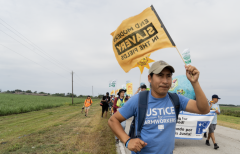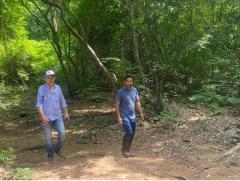source: Public Citizen
We just concluded a really significant week in the fight against the Investor-State Dispute Settlement (ISDS) system, so I wanted to send an update to all the organizations who have supported the campaign thus far.
First and foremost, we have a new, in-depth report called Corporate Colonization of Latin America: How ISDS Harms Indigenous Communities, which explores ISDS’s colonial roots and the disproportionate harm it has caused to Indigenous peoples across Latin America.
The report is available now both as a website and as a PDF, so give it a look and please consider sharing it on social media or on any lists!
To release the report, earlier this month we hosted a special delegation of Latin American Indigenous leaders in Washington, DC to speak with policymakers, diplomats, and civil society about the adverse impacts of corporate trade policy on their communities.
Here’s a brief summary of what went down:
- Ms. Venessa Cárdenas and Mrs. Luisa Connor – educators and Afro-Indigenous community leaders from Crawfish Rock, Honduras – spoke to policymakers and civil society about the absurd ISDS lawsuit Honduras is facing from a U.S. corporation demanding nearly $11 billion, two-thirds of the country’s annual budget. The two spoke in a congressional briefing sponsored by Reps. Lloyd Doggett, Rosa DeLauro, and Nydia Velazquez, held meetings with congressional offices on relevant committees, and met with representatives from the U.S. State Department and U.S. Trade Representative.
- Renowned Siekopai youth leader Ms. Consuelo Piaguage and Union of People Affected by Texaco representative Mr. Donald Moncay intended to travel from Ecuador to join the delegation, but the U.S. embassy did not issue their visas in a timely manner. Instead, the two called in remotely to discuss the health and environmental harms their communities have faced as a result of Chevron’s (previously Texaco) oil pollution in the Amazon – for which the Ecuadorian government found Chevron guilty. In response to the ruling, Chevron filed an ISDS case to challenge the government’s decision. Since then, Ecuador has since terminated every single trade deal with ISDS provisions. And recently, Ecuadorians voted in a historic referendum to l keep ISDS out of future trade deals.
- To cap off the week, we held a public report launch event featuring our in-person and virtual guests, which was attended by embassy officials, academics, civil society representatives, and even a few ISDS attorneys who are now having second thoughts about their industry.
- We also coordinated a number of interviews with U.S. journalists during the delegation, and several news outlets have shared findings from the report. Check out this great piece from Inside Climate News, and keep an eye out for more coverage.
- To cap off the week, we held a public report launch event featuring all of our in-person and virtual guests, which was attended by embassy officials, academics, civil society representatives, and even a few ISDS attorneys who are now having second thoughts about their industry. The event included a screening of the new documentary The Tribunal, which tracks the experiences of community members in Ecuador who were directly impacted by an ISDS case launched by a Canadian mining company.
By sharing their firsthand accounts, the delegation impressed upon decisionmakers the urgency of ending the ISDS systsem’s abuse of Indigenous rights.
We extend our deepest appreciation for their bravery and for the support of our partners, Amazon Watch, the Center for Economic Policy and Research, the Center for International Environmental Law and the Columbia Center on Sustainable Investment.
The Biden Administration has committed to leaving ISDS out of all future trade deals, and at a recent Senate hearing, USTR Katherine Tai indicated openness to removing ISDS from existing trade deals, which would be a win for Indigenous communities everywhere.
So let’s keep up the momentum!
- Right now, we’re in the final stages of building a state legislators’ sign-on letter calling for the removal of ISDS from existing U.S. trade deals. Led by Connecticut State Sen. Bob Duff, North Dakota State Sen. Tim Mathern, and North Carolina State Rep. Pricey Harrison, the letter currently has over 150 signatures, just 50 shy of our goal of 200. Could you help get the letter in front of any state reps you all are in touch with? I can provide you with a template outreach email and a target list.
Otherwise, stay tuned as the campaign rolls on. Contact Ryan Harvey rharvey@citizen.org if you would like to collaborate on this campaign to end ISDS.



